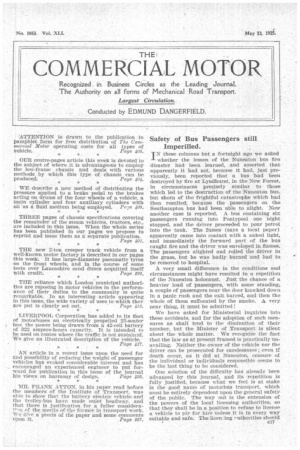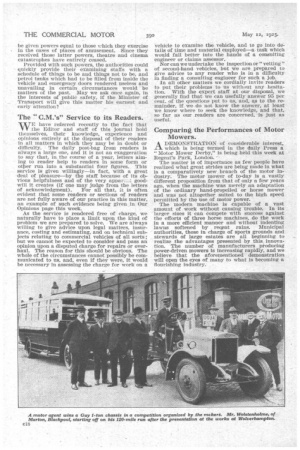Safety of Bus Passengers still . Imperilled.
Page 1

Page 2

If you've noticed an error in this article please click here to report it so we can fix it.
TN these columns but a fortnight ago we asked -11whether the lesson of the Nuneaton bus fire disaster had been learned, and asserted that apparently it had not, because it had, just previously, been reported that a bus had been destroyed by fire at Lyndhurst, in the New Forest, in circumstances precisely similar to those which led to the destruCtion of the Nuneaton bus, but shorn of the frightful catastrophe which had then resulted', because the passengers on the Southampton bus had been able to alight. Now another case is reported. A bus containing six passengers running into Pontypool one night stopped, and the driver proceeded to pour petrol. into the tank. The fumes (says a local paper) apparently came into contact with a naked light, and immediately the forward part of the bus caught fire and the driver was enveloped in flames. The passengers alighted and rolled the driver in the grass, but he was badly burned and had to be removed to hospital.
A very small difference in the conditions and circumstances might have resulted in a repetition of the Nuneaton holocaust. Just the chance of a heavier load of passengers, with some standing, a couple of passengers near the door knocked down in a panic rush and the exit barred, and then the whole of them suffocated by the smoke. A very near thing, it must be admitted !
We have asked for Ministerial inquiries into these accidents, and fel. the adoption of such measures as shall tend to the diminution of their number, but the Minister of Transport is silent about the whole matter. We recognize the fact that the law as at present framed is practically unavailing. Neither the owner of the vehicle nor the driver can be prosecuted for carelessness ; even if death occur, as it did at Nuneaton, censure of the individual or individuals responsible seems to be the last thing to be considered.
One solution of the difficulty has already been advanced by this journal, and its repetition is fully justified, because what we feel is at stake Is the good name of motorbus transport, which must be entirely dependent upon the-general safety of the public. The way out is the extension of the powers of the local licensing authorities; so that they shall be in a position to refuse to license a vehicle to ply for hire unless it is in every way suitable and safe. The licen:ing 7uthorities should
be given powers equal to those which they exercise in the cases of places of amusement. Since they received those latter powers, theatre and cinema catastrophes have entirely ceased.
Provided with such powers, the authorities could quickly provide their examining staffs with a schedule of things to be and things not to be, and petrol tanks which had to be filled from inside the vehicle and emergency doors rendered useless and unavailing in. certain circumstances would be matters of the past. May we ask once again, in the interests of public safety, if the Minister of Transport will give this matter his earnest and early attention?
The " C.M.'s" Service to its Readers.
WE have referred recently to the fact that the Editor and staff of this journal hold themselves, their knowledge, experience and opinions entirely at the disposal of their readers in all matters in which they may be in doubt or difficulty. The daily post-bag from readers is always a large one, and it is not an exaggeration. to say that, in the course of a year, letters aiming to render help to readers in some form or other run into a substantial four figures. This service is given willingly—in fact, with a great deal of pleasure—by the staff because of its obvious helpfulness and of the very appar:::: goodwill it creates (if one may judge from the letters
of acknowledgment). For all that, it is often evident that some readers or sections of readers are not fully aware of our practice in this matter, an example of such evidence being given in Our Opinions page this week.
As the service is rendered free of charge, we naturally have to place a limit upon the kind of problem we are prepared to solve. We are always willing to give advice upon legal matters, insurance, costing and estimating, and on technical subjects relating to commercial vehicles of all sorts; but we cannot be expected to consider and pass an opinion upon a disputed charge for repairs or overhaul. The reason for this should be obvious. The whole of the circumstances cannot possibly be communicated to us, and, even if they were, it would he necessary in assessing the charge for work on a vehicle to examine the vehicle, and to go into details of time and material employed—a task which would fall better into the hands of a consulting engineer or claims assessor. Nor can we undertake the inspection or " vetting " of second-hand vehicles, but we are prepared to give advice to any reader who is in a difficulty in finding a consulting engineer for such a job. In all other matters we cordially invite readers to put their problems to us without any hesitation. With the expert staff at our disposal, we generally find that we can uSefully answer 95 per cent. of the questions put to us, and, as to the remainder, if we do not know the answer, at least we know where to seek the knowledge, and that, so far as our readers are concerned, is just as useful.
Comparing the Performances of Motor Mowers.
A DEMONSTRATION of considerable interest, which is being termed in the daily Press a " Motor Mower Derby," is being held this week at Regent's Park, London.
The matter is of importance as few people have realized what great strides are being made in what is a comparatively new branch of the motor in dustry. The motor mower of to-day is a vastly different proposition from that of only a few years ago, when the machine was merely an adaptation of the ordinary hand-propelled or horse mower and was not altogether suited to the high speed permitted by the use of motor power. The modern machine is capable of a vast amount of work without causing trouble. In its larger sizes it can compete with success against the efforts of three horse machines, do the work in a more efficient manner and without indenting lawns softened by reeent rains. Municipal authorities, those in charge of sports grounds and stewards of large estates are all beginning to realize the advantages presented by this innova tion. The number of manufacturers producing power-driven mowers is increasing rapidly, and we believe that the aforementioned demonstration will open the eyes of many to what is becoming a flourishing industry.
































